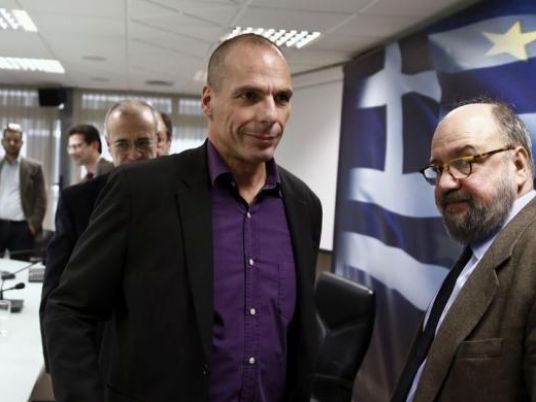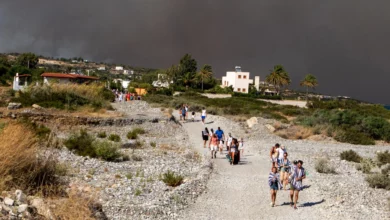
Greece could call a referendum or have early elections should its eurozone partners reject its debt and growth plans, Greek Finance Minister Yanis Varoufakis said in a newspaper interview on Sunday.
The new Greek government, led by Alexis Tsipras, won an election in January promising to renegotiate a bailout agreed with the International Monetary Fund and its European Union partners that requires strict budget discipline and sweeping economic reforms.
The government reached a temporarily deal with its lenders last month and Athens has until the end of April to specify the reforms it will make in exchange for further aid. Eurozone finance ministers are meeting on Monday in Brussels to discuss a letter of pledged reforms sent by Athens last week.
Should Brussels ultimately reject Greece's proposals, Varoufakis told Italian daily Corriere della Sera: "There could be problems. But, as my prime minister has said, we are not yet glued to our chairs. We can return to elections, call a referendum."
In a statement released later on Sunday, the Greek Finance Ministry said that Varoufakis was responding to a hypothetical question and that any referendum would "obviously regard the content of reforms and fiscal policy" and not whether to stay in the euro, as Corriere della Sera had suggested.
Most Greeks want the country to keep the euro, but two-thirds also continue to back the government's tough stance to renegotiate the bailout package.
A referendum over a deal with lenders that keeps the country in the eurozone but falls short of Tsipras's promises could give the government cover to accept a deal even though it was elected with a different mandate. But even floating the idea of a referendum is politically risky.
In 2011, then-prime minister George Papandreou suggested calling a referendum over the bailout and was later forced to make way for a unity coalition led by a former central banker.
With the Tsipras government's popularity level above 40 percent, Varoufakis said "people understand" that the government is fighting the "establishment that said it was saving Greece while it put everything on the backs of the poor".
"Irresponsible"
Former prime minister Antonis Samaras, who is now head of the main opposition party, said a referendum would be "a very bad development" and allow the government to shrug off its responsibilities.
The now much-diminished Greek Socialist PASOK party, also in the opposition to Tsipras' radical left alliance, said in a statement that Varoufakis's statement was "irresponsible, thoughtless and contradictory".
In the interview, Varoufakis said that the response so far by eurozone partners to his proposals to replace its current debt with bonds linked to nominal growth is "silence."
"I'd like for Europe to understand that this would be a way of paying back more money, not less," Varoufakis said of the growth-linked bonds.
In 2011, Greece tipped the entire eurozone into crisis until it accepted the bailout. Now the concern is that the failure of Greece to reach a new deal with lenders will throw the euro region back where it was.
There has been growing uncertainty over Greece's cash position. It faces a decline in tax revenues, while aid from EU/IMF lenders remains on hold until Athens completes promised reforms.
In the same interview, Varoufakis said that the state had the money "to pay pensions and public administration salaries" and he said Greece does not need a new, third loan to pay its bills.
He also criticized the European Central Bank for being "disciplinary" in not letting Athens issue more short-term debt, and said the central bank should buy Greek debt as part of its bond-buying program right away and not this summer, as it has said it would.




